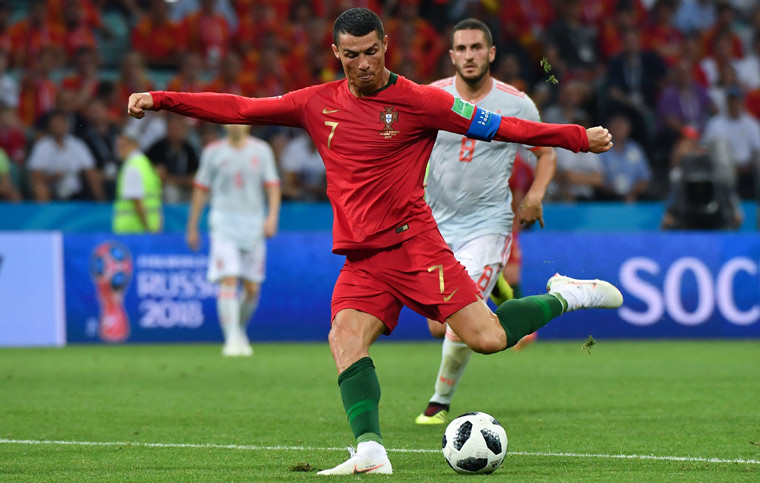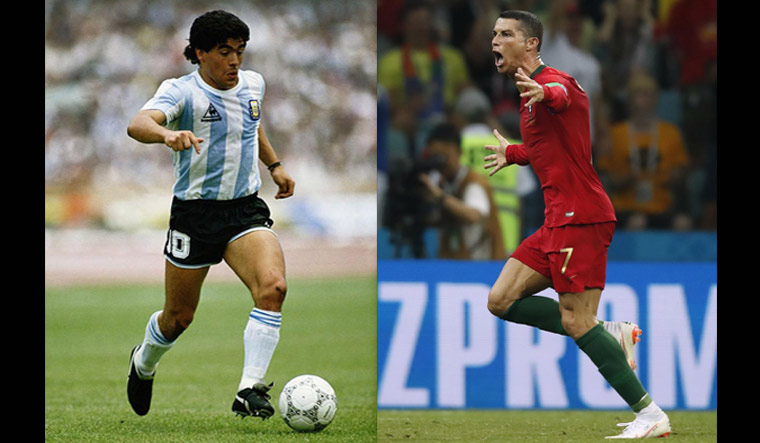When Cristiano Ronaldo stated that he is the best player in history, after winning his fifth Ballon d'Or in December, it surprised few. But, as expected, it did attract scathing reactions. Diego Maradona was among those who pooh-poohed his claim.
“Ronaldo said he's the best ever? Tell him to stop talking nonsense,” Maradona retorted. The Argentine legend went on to claim that he would have won more Ballons d'Or had he been eligible for it in his time. Only Europeans qualified for the award until 1995.
Nobody in the history of the Cup has dragged a team to victory like Maradona did in 1986. Leading a below-par Argentina squad, Maradona scored five goals and assisted another five, playing an influential role in each of Argentina's games.
The scenario is a similar one for Ronaldo at this World Cup. Scoring a hat-trick against Spain in Portugal's opening game of the campaign, he once again proved that his claims of being the best player of all time may not be too far from the truth.
The Portuguese captain showed that he could lead a team to glory when Portugal won the Euro 2016, beating hosts France in the final. He may not have played the whole final, but his presence on the touch line was instrumental in edging out a star-studded France.
Some might argue that it is wrong to write off the entire Portugal side as poor. The midfield unit is a relatively sturdy one. Nothing comparable to Spain's midfield, but William Carvalho and Joao Moutinho bring a bit of stability to the game, while young attackers like Bernado Silva, Goncalo Guedes and Andre Silva are on the rise. But the talent of all these men put together do not come close to Ronaldo's influence on the game.
If Ronaldo were to do the impossible and help Portugal reach the summit, he will need more than his skill set or his leadership. As was in the case of the 2016 Euro, a favourable draw can go a long way in determining the outcome of a knockout tournament.
Portugal did not win a single group stage game at the continental tournament, but advanced as one of the better third-placed team, having drawn all three games. Thereafter, the side scraped past Croatia and then Poland, winning both games after regular time. Then came Wales in the semifinal, which hardly put up any fight against the Portuguese.
Reaching the final, Portugal managed to avoid heavyweights Spain, Italy, Germany, Belgium and England, all of whom fell by the wayside, until they met their first big challenge in France. If Portugal does advance from its group, it will come across relatively easy opponents from Group A, arguably the weakest group in the tournament.
 Cristiano Ronaldo shoots to score his second goal during the FIFA World Cup 2018 Group B match between Portugal and Spain | AFP
Cristiano Ronaldo shoots to score his second goal during the FIFA World Cup 2018 Group B match between Portugal and Spain | AFP
Thereafter, if Portugal faces one of the second placed teams from groups C or D, in the quarterfinal, that should take them easily to the semifinal, where they are sure to face a major challenger, chances being Germany or Brazil. That is how important the knockout bracket can be in such a competition.
Portugal's next games are against Morocco and Iran, teams that should not cause much trouble. When Ronaldo scored three goals against Spain in the opening group game, it was his 51st career hat-trick and also the 51st hat-trick in World Cup history. The stars are aligning for him.
Lionel Messi's Argentina has faltered in their first game against lowly Iceland, with the talisman missing a crucial penalty. More than Messi, it is Ronaldo who seems to be marshalling his team and hitting all the right notes at this World Cup, similar to what Maradona did way back in 1986. Their influence on their respective sides is comparable and makes one doubt whether football is indeed a team sport.
It is too early to say if Portugal can progress that far in the competition, but at 33, this will be Ronaldo's last chance to prove that he can be considered the best player of all time. All he has to do is to pull off a Maradona and lead his team to glory.


